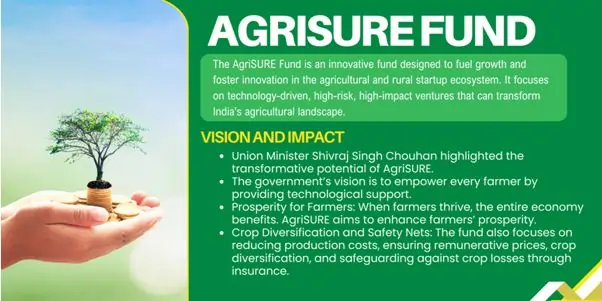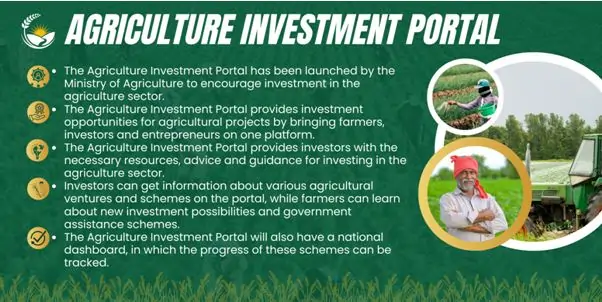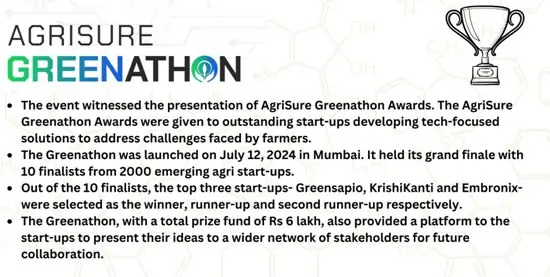The Agrisure Fund is one of the latest developments
that government of India embarked on a very recent
occasion with the aim of promoting innovation in
the agricultural and rural start-ups.
What is Agrisure Fund?

The Agrisure Fund is a unique fund created for
the purpose of stimulating development and
stimulating innovation in the agriculture and
rural start-up world.It aims at technology-based,
high stakes and big returns that could revolutionize
agricultural business in India.
Key Details:
- Total Corpus: By way of investment, the fund has a ‘hybrid’ capital of ₹750 crore ($100 million).
- Contributors: ₹250 crore from the Government of India through SEBI Registered Category II, Alternative Investment Fund.₹250 crore in term of loan from National Bank for Agriculture and Rural Development.₹250 crore that was brought from banks, insurance companies, and other private organisations.
Objectives:
- Empowering Start-ups: Agrisure is launched with the intention of funding working on innovative and agronomical ideas.
- Rural Enterprises: it will provide support to the rural businesses those are helping to progress in agri-industry.
Purpose of the fund, Vision, and desired Impact
Vision of the Agrisure Fund:The idea of operation behind the
Agrisure Fund is the total makeover of the existing agriculture
sector in India majorly driven by technological intervention,
innovation, and entrepreneurship.Here are the key aspects of
its vision:
- Empowering Start-ups: The fund has been designed in similar lines to enable tech led start-ups in the fresh agriculture and allied services. But it specifically strives to foster an environment to nurture agri-tech start-ups by funding their businesses, research and development.
- Enhancing Rural Economy: With such approaches, the fund aims at developing the rural economy with advance solutions. There is an implication that, when rural enterprises exist, it leads to a development of the entire economy.
- Technology Adoption: The vision is to ensure closure of the technology divide especially in the agricultural field. To support and transform the life of farmers it targets to create, encourage, the use of modern tools, precision farming techniques, and digital platforms.
Impact of the Agrisure Fund:
- Supporting High-Impact Ventures: Agrisure operates in costly and high-reward environment, which is preferred by many investors. It directly brings about change by investing in start-ups that seek to solve some key issues in the field of agronomy.
- Climate Resilience: Environmental sustainability is one of its focus areas with particular reference to climate smart practices. These are sustainable practices as mentioned above such as precision farming, which makes production better with limited inputs and resources.
- Farmers’ Empowerment: Through technology, machinery and innovative solutions, Agrisure definitely finds itself directly involved in meeting the needs of the farmers. This is perhaps a very simple but profound truth, welfare of farmers improves welfare of the sector as a whole.
- Market Linkages: It can enhance the market linkages for farmers where start-ups existing with the fund can make the necessary difference. This translates into better storage facilities, efficient means of transport or direct access to markets and results to higher income.
- Innovation Ecosystem: In this way, the entrance of more start-ups into agri-tech is fostered through the creation of the right environment by the fund. This in turn leads to growth of technology.
How can farmers access the benefits of this fund?
The newly launched Agrisure Fund of the Government of India presents a lot of hope to the farmers and rural industries.
- Investment-Friendly Environment: Agrisure Fund will seek to promote venture capital investment environment favourable to start-ups in agriculture and allied sectors. What this means is that next generation ventures focusing on delivering solutions to farmers that are at the frontier of innovation have funding at their disposal.In this way, the fund creates favourable conditions for investment thus giving stimulations to start-ups to attract and absorb capital necessary to support farmers.
- Support for Technology-Driven Start-ups: The core structure of the Agrisure Fund centres on funding technology-oriented start-ups. Such start-ups can use this fund in order to build and expand their unique products and services.The following categories of start-ups are allowed to apply for funding; agri-tech, farm machinery, value chain optimization, and IT based services.
- Focus on the Agricultural Value Chain:The fund is aimed to achieve high-risk, high-reward interventions in all stages of the agricultural value-chain. This encompasses different phases on the manufacturing process to the final supply of the products. Any start-up of producing enhanced quality of the farm produce, better storage, transport and marketing chain will have a lot of benefit from this act.
- Empowering Farmers through Technology: To achieve this, the company focuses on Agrisure technology or strategy which seeks to give farmers premium status by making them have access to modern technology or tools. This may include improved farm machinery, optimal input application technologies, or farm management software.Technological advancement of agriculture hence helps eliminate some of the constraints of the fund hence favouring the farmers and making them more productive.

- Encouragement for Farmer Producer Organizations (FPOs): These centres are important in pooling farmers’ produce, bargaining for better prices or lobbying for better returns for the farmers.The Agrisure Fund has motivated FPOs to be innovative and to seek for funds that will improve their organizations.
- Machinery Rental Services: It also provides funding for business such as machinery rental services that deals in technology-based farming equipment for rental to farmers. It can enhance the use of farm inputs that otherwise would require ownership and hence improve efficiency on the farms.It may help start-ups who rent products and services to reach out and have a wider effect on more people.
- Collaboration with Private Capital: It usually involves the government and private capital In the name of Agrisure. Rest Rs 250 crore of the total corpus is being contributed by the private investors.In this manner, there is healthy diversification of the funding and the outreach of the fund is also expanded.
Some of the Challenges that comes with the Fund:
Despite the positive prospects by the Agrisure Fund initiative in raising an agricultural revolution in India, it should also be noted that no programme is without its difficulties, similarly challenges here are:
- Financing Challenges: However, finding capital for agricultural start-ups has always been constricting. This is the case even with government encouragement, where raising capital can at times be a challenge, particularly for young businesses.Every innovator suffers a lot of hard time explaining the concept and its feasibility to investors within agricultural businesses. Closing this gap is important for the realization of Agrisure–supported start-ups.
- Technology Development Gap: India has more than 40 universities and institutions dedicated to agriculture and related disciplines, although there appears to be minimal local innovations capable of addressing the pressing problems of agriculture.Though there are significant achievements in global practices on agri-tech, they must be delivered where and at a cost which remains a challenge universally.
- Last-Mile Adoption: As we try to make available these innovative solutions it is not easy to get them implemented on the ground especially in reaching the small scale and marginal farmers.Issues like awareness, availability of training materials and trainings, accessibility of these resources are some of the factors.
- Climate Resilience and Sustainability: Agrisure supports initiatives that make improvements aimed at reducing unfavourable effects under climate change, besides practicing sustainability.Maintaining specific performance levels while at the same time ensuring that these come in harmony with the natural environment can prove to be a very difficult task.
- Market Linkages and Value Chain Integration: However, one key issue that remains evident when attempting to offer sieve support to ventures within the Agrisure value chain is the issue of linking the farmers, processors and markets.Storage, transportation and marketing factors which requires attention includes efficient storage transportation and market access.
- Inclusivity and Smallholder Farmers: The agri-private-public partnership – Agrisure should embrace the small holder farmers who are the major providers of agricultural products. They have specific needs and limitations that have to be dealt with.Appropriate incentives should therefore be designed for resource deprived farming households if fairness of intervention is to be achieved.
- Behavioural Change and Adoption: New technologies, processes, systems or even approaches usually entail changing the behaviour of the people involved. To some extent, farmers may be slow to change, stick to traditional manner of farming.For Agrisure to succeed there must be strategies of creating demand, gaining trust of the farmers and showing that there are benefits.
Way Forward
Investment-Friendly Environment:
To create an investment-friendly climate, the following steps can be taken:
- Awareness Campaigns: orient investors to the opportunities of investing in agri-tech start-ups. Emphasise positive results and bring out good examples concerning the application of technology in agriculture.
- Incubators and Accelerators: Develop new incubation centres and accelerators exclusive to the agri-tech business. These can afford the opportunity for mentorship, contacts, and funding.
- Policy Support: Simplify the number of rules, and encourage the use of tax credits in the funding of agri-tech ventures. Remind venture capital firms on the need to set aside capital for this type of business.
Technology Development Gap:
Bridging this gap involves:
- Research Collaborations: Develop partnerships between universities and research institutions and new ventures. Promote cooperation to build context relevant technologies.
- Hackathons and Competitions: Sponsor events whereby contestants are compelled to develop cheap, locally applicable solutions. Such circumstances can give boost to advance technology at a faster rate.

- Open Innovation Platforms: Initiate forums through which innovators can work together as well as build on experiences and ideas on the existing technologies.
Last-Mile Adoption:To
To ensure technology reaches smallholder farmers:
- Extension Services: Enhance extension services which are used in putting across information on new technologies. Therefore field-level demonstrations and training programs are important.
- Localized Solutions: Create new technologies that are appropriate to the regional needs, languages as well as cultural practices. Customization is the major factor which influences the level of adoption.
- Farmer-Entrepreneur Networks: Promote technology adoption by inspiring those farmers who enjoy using technology as farmers and pass it to other farmers. It should be noted that Peer-to-Peer learning as a model of increasing the use of technologies can be effective.
Climate Resilience and Sustainability:
- Climate-Smart Agriculture: Encourage measures for change in climate. Such crops as through them and water efficient, select irrigation and management of the soil health.
- Incentivize Sustainable Practices: Give incentives for going green with the processes you use in your business. In return, things that are related to link sustainability should be linked to financial benefits.
- Research on Resilient Varieties: Supporting, breeding of crops varieties that are resistant to various unfavourable weather conditions
Market Linkages and Value Chain Integration:
To improve market access:
- Aggregator Models: Supporting FPOs Cooperatives and Farmer aggregation networks. They can accumulate commodities, bargain for better price and market farmers in market places.
- Cold Chain Infrastructure: Hire structures for storage, transportation and processing among other assets as investments. Integrated and effective supply chain management systems help in minimization of losses after harvest plus increase market access.
- Digital Platforms: Create applications or systems that facilitate the selling of products by the farmers without the help of third parties.
Inclusivity and Smallholder Farmers:
Prioritize smallholders by:
- Affordable Solutions: It is the responsibility to make sure that these technologies are affordable and within an organization’s reach. Or subsidies or even micro-financing can help for instance are all common ideas that individuals with little knowledge of marketing can come up with.
- Localized Training: Introducing and training extension workers on how to deal with smallholders. In addressing them, one needs to understand the difficulty level needed and come up with revolutionary solutions.
- Community Participation: The welfare of farmers should be considered in decision making processes so that they are also an input for the process
Policies, research, entrepreneurship, and farming are the part of the change process and there must be coordination between them. Despite this, the Agrisure Fund can act as a stimulus, but more efforts will be needed to give the necessary continuity that can bring about change.